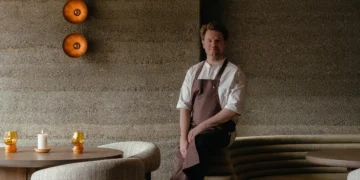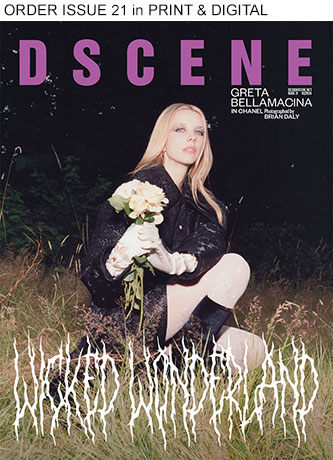
Following its transformative reopening this April at Hotel De L’Europe Amsterdam, Restaurant Flore emerges with a clear, refined vision. Under the leadership of chef Bas van Kranen, the two-Michelin-starred and Green Star-awarded destination reaffirms its place at the forefront of conscious fine dining. Known for his deep-rooted commitment to Dutch micro-seasonality and close relationships with local producers, van Kranen continues to challenge traditional notions of luxury by centering flavour, craft, and awareness.
RESTAURANTS
The newly reimagined space, designed in collaboration with Reiters-Wings, extends this philosophy into its architecture, with carbon-negative lime hemp walls, reclaimed materials, and an undulating ceiling inspired by the nearby Amstel River. At Flore, every detail invites guests into a tactile, immersive dialogue between place, ingredient, and intention.
To explore this next chapter, DSCENE editor Katarina Doric meets with Chef Bas van Kranen for a conversation on redefining value in fine dining, the limits of the term “sustainability,” and how true creativity starts with what’s close to home.

With Flore reopening at Hotel De L’Europe this April, what inspired the transformative changes during the renovation? – This next chapter of Flore feels like a natural evolution. We have been growing toward this moment, refining our ideas around conscious fine dining, and now finally translating that philosophy into our physical space. Guests will enter a place that breathes the same values as the food. From carbon-negative lime hemp walls to the rippling ceiling inspired by the Amstel River, the new design reflects our surroundings and flows seamlessly from the classical elegance of De L’Europe into something more organic, personal, and grounded. It’s still fine dining, just with both feet in the soil.
We’re not here to change the world or tell people what to eat – we’re simply showing how delicious food can be when you start with what is close to home and approach it with respect.
Guests are invited to interact with your team, sample pickles, and learn about your ingredients from the very start. How does this exchange deepen their connection to your culinary philosophy? – This interaction breaks down the traditional barrier between kitchen and dining room, making our approach transparent from the moment guests arrive. By tasting fermented ingredients and meeting the team behind their creation, guests begin to understand our preservation techniques and hyperlocal sourcing before they even sit down. This creates a deeper appreciation for the dishes that follow and allows diners to become active participants in their experience.
For us, conscious fine dining means being aware of what we do, how we do it, and how it affects our environment and the people around us. These interactions help guests understand that most of our ingredients come from the Netherlands, from farmers and producers we know personally. By meeting our team and sampling our preserved ingredients, guests begin to appreciate that we’re not here to change the world or tell people what to eat – we’re simply showing how delicious food can be when you start with what is close to home and approach it with respect. This transparency creates a deeper connection to the care and story behind each dish.

Your approach to fine dining is deeply rooted in sustainability and conscious gastronomy. How will the newly renovated Flore further push these boundaries? – I try to stay far away from the word ‘sustainability’. To me it feels overused, often greenwashed, and doesn’t capture what we are really doing. We are not sustainable, and we are not pretending to be. Running a restaurant is never going to be completely sustainable. But we can be aware. The renovated space extends this awareness beyond the plate – the materials we chose, lime hemp, reclaimed wood, limestone, are all local, as are the artworks made for the restaurant. They connect naturally to the way we think about ingredients. It is about consistency, honesty, and making choices that align with the rest of the experience.
I try to stay far away from the word ‘sustainability’. To me it feels overused, often greenwashed, and doesn’t capture what we are really doing. We are not sustainable, and we are not pretending to be. Running a restaurant is never going to be completely sustainable. But we can be aware.
You’ve built strong relationships with local farmers, fishermen, and foragers. How do these collaborations influence the seasonal menus at Flore? – These relationships form the foundation of everything we create. Everything starts with flavour. We work with people who grow for taste, not volume. That already makes a huge difference. Our ingredients come from farmers and producers we know personally, people who care deeply about what they grow. We track micro-seasons closely, harvesting at the exact moment when an ingredient is at its best. When a farmer tells us they’ve harvested something at its peak, we build a dish around it. When fishermen report on sustainable catch variations, we adapt immediately. This approach keeps us nimble and genuinely connected to the micro-seasons of the Netherlands, with our menu sometimes changing weekly to reflect what’s truly exceptional at that precise moment.

The Dutch microclimate plays a key role in your culinary vision. In what ways do its seasonal shifts shape the dishes you create? – We track micro-seasonality on a weekly rather than quarterly basis, which reveals the subtle shifts in flavour that occur even within what most consider a single season. Porcini mushrooms are a perfect example – they appear suddenly in huge amounts, grow fast, and vanish just as quickly. The same goes for young edible pinecones. When they arrive, we drop everything and start preserving, fermenting, drying, preserving in oil, testing new methods each year to push ourselves and find different expressions. Our menu responds directly to these micro-seasonal shifts, which is why we might change dishes weekly rather than quarterly. This focus and timing are what gives the food its intensity.

As Flore evolves, can you share any exciting experiments or innovative techniques being explored for your future offerings? – For us, innovation isn’t about flashy techniques or trends. It is about going deeper. We will continue exploring preservation, fermentation, nixtamalization, and other techniques that bring out flavours in natural ways. We are constantly testing, failing, learning, and improving in our Research & Development kitchen. Working within a local context forces us to go deeper. If we were not using wagyu or foie gras, we need to rely on fermentation, preservation, and other techniques to build depth. There is no finish line, just a commitment to care and keep evolving. We’re also developing new preservation techniques inspired by traditional Dutch methods but updated with modern understanding of microbiology. These innovations allow us to maintain our strictly local sourcing while continuously expanding our flavour palette.
There is no finish line, just a commitment to care and keep evolving.
Pickling and fermentation are integral to your cuisine. What unique preserved elements can guests expect to experience at the new Flore? – Our expanded fermentation program has allowed us to develop multi-stage ferments where ingredients undergo several transformations – a gooseberry might become a vinegar, then be used to ferment another ingredient, creating complex, layered flavours impossible to achieve otherwise. We’re also exploring vegetable-based miso’s using local legumes, house-made plant-based alternatives to dairy, and techniques for aging vegetables in controlled environments similar to dry-aging meat. These preserved elements appear throughout the menu, sometimes as subtle background notes and other times as the star of a dish.

Flore is renowned for favouring hyperlocal, sustainable sourcing over traditional luxury ingredients. What challenges do you face in maintaining this ethos, and how do you overcome them? – The greatest challenge is maintaining consistent quality while being entirely subject to local availability. We overcome this through our extensive preservation program, transforming seasonal abundance into ingredients we can use year-round. Another challenge is shifting perceptions about what constitutes luxury. We’re not making a political statement – we’re simply showing that the most special culinary experiences often come from respecting natural boundaries and deepening connection to a specific place.
With Flore set to reopen in April 2025, how do you envision this new chapter influencing the restaurant’s evolution and overall guest experience? – This reopening represents the full expression of our philosophy – a place where the physical space breathes the same values as the food. More than anything, I want to inspire chefs, guests, and the people around me to get closer to their ingredients. Visit your producers. Ask questions. Know the story behind what you put on the plate. That’s where real creativity starts. The redesigned environment creates a more immersive experience where every element tells part of our story, fostering a community of people who share our values around conscious enjoyment of food.

Conscious fine dining is gaining traction globally. How do you see its role evolving in the future of gastronomy, and what part will Flore play in that movement? – We are not here to change the world or tell people what to eat. Conscious fine dining for us means being aware of what we do, how we do it, and how it affects our environment and the people around us. I believe both environmental pressures and changing consumer values will continue to transform what we consider luxury in dining. Flore’s role is to demonstrate that awareness can coexist with the highest levels of gastronomy – that it enhances rather than limits the dining experience. We hope to influence the criteria by which restaurants are judged, pushing organisations like Michelin to place greater emphasis on environmental impact alongside culinary technique. By documenting and sharing our methods, we aim to create a replicable model that chefs worldwide can adapt to their local contexts.
Visit your producers. Ask questions. Know the story behind what you put on the plate. That’s where real creativity starts.
What do you hope guests take away from their experience at Flore – not just in terms of flavours, but also in mindset and appreciation for sustainability? – Beyond memorable flavours, I hope guests leave with a shifted perspective on what constitutes true luxury and quality. I want them to recognise that care and connection are what make something truly special – knowing the full story behind each ingredient and the people who produced it. If guests leave Flore with a deeper appreciation for the richness that can come from what is close to home, approached with respect and technique, then we’ve succeeded in our mission.

Restaurant Flore
Located in Hotel De L’Europe
Nieuwe Doelenstraat 2-14, 1012 CP Amsterdam, Netherlands
Reservations@restaurantflore.com
+31 20 730 3398
restaurantflore.com



















